#wagahai wa neko de aru
Text







In my dream I met Natsume Soseki.. but I didn't speak with him because I woke up before I could
#japanese art#japanese literature#natsume soseki#i am a cat#wagahai wa neko de aru#kokoro#20th century literature#dead writers#collage#cats
5 notes
·
View notes
Text

#i am a cat barista#josei#josei manga#manga cap#wagahai wa neko de aru shokugyou wa barista#this sound promising#yes i love stories with cats as the main characters
8 notes
·
View notes
Text

QOTD: Tea or coffee?
I LOVE the smell of #coffee but it makes my heart race (even decaf) so I sadly have to stick with tea. *sobs*
Thankfully I like fruit tea with honey & lemon a lot! :D
Also I love this josei manga! Highly recommend if you need an uplifting & encouraging read!
YouTube Video Review: https://youtu.be/ylOzF16TGbE
#I am cat barista#cat manga#cats#cat barista#manga recommendation#manga cover#manga community#josei manga#josei#Wagahai wa Neko de Aru Shokugyou wa Barista#吾輩は猫である 職業はバリスタ#manga love#manga art#anime and manga#manga#manga recommendations#cat lovers#manga of the day#completed manga series
2 notes
·
View notes
Text
New Platonic F/O Headcanon:
As Fuzukawa is president of the Armed Detective Agency and Mr. Sholmes is, well, Mr. Sholmes, they often end up meeting each-other due to their line of work.
But...Fuzukawa ends up making all kinds of inane excuses to meet up with Mr. Sholmes at Baker Street - handing off reports, consulting about the smallest things, etc.
The reason being? So Fuzukawa - a known Cat Person™ - can have excuses to pet Wagahai.


[Banners described in alt text]
#platonic: great detective#platonic: all men are created equal#pet: wagahai wa neko de aru#platonic f/os#fictional others#self shipping#self shipping community
4 notes
·
View notes
Text

I Am a Cat Barista
2 volumes (in English as of 4/17/2023, ongoing.)
Licensed by Seven Seas
For some people, the daily grind of city life is exhausting. Yet somewhere between the busy streets there’s a mysterious cat café that can only be found by weary souls. What’s on the menu? A delicious drink, specially brewed for each customer…by a cat barista!
Status in Country of Origin
2 Volumes (Ongoing)
Tags:
Animal Characteristics
Bar/s
Cat Boy/s
Cat/s
Episodic
Non-Human Protagonist
#i am a cat barista#Wagahai wa Neko de Aru Shokugyou wa Barista.#MAIJIMA Hiro#overlap#Comic Qurie#2019#2010s#seven seas#ongoing#manga#josei#slice of life#supernatural
1 note
·
View note
Text
AND all of the text from the first screenshot of words is from/refers to I Am A Cat by Natsume Soseki??
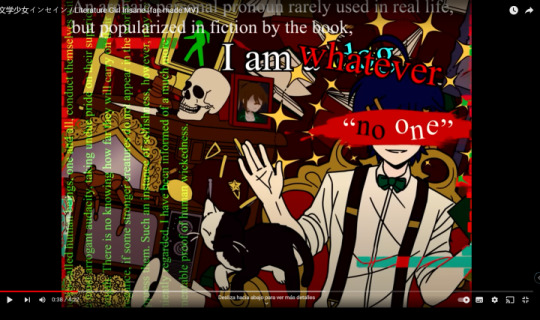
"(wagahai), an archaic personal pronoun rarely used in real life, but popularized in fiction by the book,"
-> "Sōseki's title, Wagahai wa Neko de Aru (I Am A Cat), uses a very high-register phrasing more appropriate to a nobleman, conveying grandiloquence and self-importance. This is somewhat ironic, since the speaker, an anthropomorphized domestic cat, is a regular house cat of a teacher, and not of a high-ranking noble as the manner of speech suggests." from I Am A Cat's wiki page/
"so-called human beings, one and all, conduct themselves with the most arrogant audacity, taking undue pride on their superior strength. there is no knowing how far they will carry on their arrogance, if some stronger creatures do not appear in the world that suppress them. such an instance of selfishness, however, may be conveniently regarded. i have been informed of a much more ??mentable proof of human wickedness."
"i am a cat a dog whatever "
#danganronpa despair time#drdt mv!#david chiem#something tells me this man is built on japanese literature
26 notes
·
View notes
Note
I need to know what wagahai means Right Now /lh
oh this is a fun little language lesson! so japanese doesn't have pronouns in the same way that english and romance languages do. In practice, the only commonly-used pronouns in japanese are personal pronouns, essentially the equivalent of "I" in english, which a person uses to refer to themself. if you consume a lot of japanese media you might recognize common pronouns like watashi, boku, ore, etc. in japanese media, a character's manner of speech is often a huge part of their characterization, and this includes their personal pronoun. bubbly female characters will often use atashi, a slang version of watashi that gives off a girlier vibe, young/inexperienced male characters will use boku, delinquents or teenage boys will often use ore, etc etc. wagahai is technically a personal pronoun, but it's VERY outdated and suggests self-importance/nobility, so it's NEVER used in modern japanese. it's sort of like talking to someone in pompous, accented old english. it instantly gives off a vibe of like, outdated pretentiousness yknow?
so the reason morgana, a talking cat character, uses wagahai despite it being so outdated is a reference to a novel by natsume soseki called "i am a cat" or "wagahai wa neko de aru" in japanese. the narrator of the book is a housecat who uses the pronoun wagahai and archaic phrasing in general as a sort of humorous juxtaposition to the fact that he's just a housecat living with his incredibly normal middle-class owner (the pronoun wagahai was already outdated when the book was written in the early 1900s.) "wagahai" as a pronoun nowadays is usually only used by self-important animal characters as a reference to the book. (i believe bowser also uses wagahai in the japanese mario games? correct me if im wrong.) anyways the reason i mentioned it was weird that morgana keeps using wagahai as a human is that the only phrase that wagahai evokes in my head is wagahai wa neko de aru, literally meaning I AM A CAT. almost anyone who knows modern japanese would think it's weird to hear a modern human using it lmao
#morgana neko ja ne echoing in my head as i write this. i know youre not a cat king but also you literally are <3#took a break from being devastated over akechi reveal no. 3 to write this LMAO#anyways persona 5 does a lot of fun things w pronouns in the japanese version!! personal fav was akechi switching between boku and ore#asks#and you may be asking 'blue you are nowhere near fluent in japanese why do you know this much about an archaic pronoun and its relationship#to a 1900s novelist?' and yknow what. fair question. unfortunately the answer is ace attorney
100 notes
·
View notes
Text
“After first distinguishing what he called ‘homosexuality in the narrow sense’ [kyōgi no dōseiai] from (desexualized) ‘homosexual emotions’ [dōseiaiteki kanjō] Doi Takeo wrote that he knew of ‘no literary work that portrays so acutely the nature of homosexual emotions in Japanese society as Natsume Sōseki’s Kokoro.’ Although I disagree with Doi’s arbitrary division between ‘homosexuality in the narrow sense’ and ‘homosexual emotions,’ he was certainly right to note that Kokoro has a great deal to say about relations between men in modern Japan...
The question of where exactly to locate the relationships described in Kokoro between the two extremes of the homosocial continuum remains an open one, all the more so given that Sōseki wrote the novel during a period in which words like gay and lesbian did not exist, and although the term ‘homosexuality’ had been recently translated into Japanese, it possessed nowhere near the ontological heft that it has today. It was also a time, however, when both the understanding and the lived experience of sexual and gender identity were undergoing major transformations that Sōseki registered with extraordinary sensitivity over the course of his short but remarkably varied writing career. The world depicted in his early works such as I Am a Cat [Wagahai wa neko de aru] (1905), Botchan (1906), and The Poppy [Gubijinsō] (1907), for example, centers almost exclusively around men’s relations to other men, with women figuring only as other worldly temptresses or beatific mother substitutes. In later works, such as The Wayfarer (1913) and Light and Darkness [Meian] (1916), by contrast, he increasingly focused on the world of relations between ordinary (bourgeois) men and women. In the increasingly heterosocial world of the late Meiji elite, romantic love between men and women was no longer seen as it once was—either as ridiculous or embarrassing or as a betrayal of other men—even as the androcentric world of early Meiji had come to seem hopelessly old fashioned. Kokoro is a novel that dramatizes this shift.
If the chasm that separates Sensei and his young friend (the novel’s two narrators) is the same chasm that separates a homosocial past from the heterosocial future, it is of course also true that the two men’s lives and experiences overlap. Insofar as the novel gives both narrators a voice without ultimately adjudicating between them, it can be read simultaneously as Sōseki’s melancholic tribute to the male homosocial world of his youth and as a ‘progressive’ critique of that same world for its exclusivity and misogyny.17 In this sense, Kokoro is a quintessentially two-timing text. To read Kokoro only in either of these ways, however, is to miss the way its complex narrative structure not only allowed its author to avoid passing a definitive judgment on the different modes of sexuality and sociality it presents in the persons of its two narrators, but also how it enacts a way of thinking about sexuality and subjectivity that was new to twentieth century Japan. Employing not just one but two first-person narrators to tell its story, Kokoro made intimacy among men and men, and between men and women, into a highly subjective and inherently narrative phenomenon—one that could no longer simply be named but now had to be told. As a matter for narration rather than nomination, the precise qualia of the love and intimacy experienced by characters in the novel became fatefully indeterminate, thus leading to still more narrative in the form of critical reactions. Critical debate has raged for years over the exact nature of the relationship between Sensei and his dead friend, as well as that between Sensei and his young protégé, between Sensei and his wife, and between Sensei’s wife and the younger man. Were the men simply friends? Could they have been lovers? Did Sensei ever really allow himself to love his wife? Did the younger man make a ‘cuckold’ of Sensei with his mentor’s wife? These are just a few of the questions that readers, critics, and translators have asked about Kokoro as they have continued to engage in a process that Sōseki and other novelists began—that of narrativizing sexuality.”
“17. Miyazaki Kasumi sees Sōseki’s work as exemplifying the same kind of melancholic relation to a homosocial past that I have found there. I was both stunned and pleased to find the following passage, which might as well serve as a summary of my own thesis, in her essay about Sōseki’s novel The Gate [Mon]. ‘The misfortune of men in the Meiji period was that they had to face actual women who could no longer be like Tanagra statuettes [i.e., pretty objects] while being forever cut off from the community of men to whom they had once belonged. Aside from a few exceptions like Sakai [the protagonist Sōsuke’s neighbor in The Gate], the love for men and the love for women could not exist simultaneously—just as one cannot get back the time that has already passed. When Meiji Japan set out to become a modern nation it had to make the choice to bury the homosocial continuum in the past and yield absolute dominion over the present to the heterosexual system. The result was that men in the Meiji period were eternally split between the eros of the past and the eros of the present. Such was the misfortune of Japan, where homophobia had not ruptured the connection between homosociality and homosexuality as it had in the West. This rupture between heterosexuality and homosexuality was an inevitable part of modernization but was internalized as a sort of original sin in the minds of individual [men]. Why? Because to love a woman was to betray the community of men and to betray men was to lose the right to belong to that community. Only by breaking the compact with other men and tasting the fruits of the forbidden [by loving women] could the time of the present—that of modern history—begin to flow’ (“Erosu no tsumi to norowareta kako,” 201).”
J. Keith Vincent, Two-Timing Modernity: Homosocial Narrative in Modern Japanese Fiction
5 notes
·
View notes
Text
merry is the illusionary bakeneko of course. but she also has the attitude of the cat in "wagahai wa neko de aru"
18 notes
·
View notes
Note
Not sure if anyone else has mentioned it, but Wagahai is the cat of Natsume Soseki in the game, who was actually a real person. He’s famous for writing a novel called “Wagahai wa Neko de Aru” which translates to “I am a Cat” and Wagahai’s name comes from the title (but is really just a formal way to refer to oneself in japanese)
Ooooooh that's a fun little fact, thank you for sharing it!
31 notes
·
View notes
Text
personal thoughts about playing JP games in JP vs EN, a lot of weird thoughts that probably won't make sense to many
not a dig at localization or translation or anything, just a word vomit on how im perceiving things.
theres 2 main categories in my head when i play games made by japanese devs. Western Themed, and Eastern Themed.
for Western Theme, games like final fantasy (all of it), some/few entries of fire emblems, no more heroes, and elden ring all fall into this category.
for Eastern Theme, it's games like persona, shin megami tensei, sekiro, sengoku basara, tales of series and RGG games
in my head, games in the Western Themed box are games i find far more enjoyable in english localization or dub, and actually find some of the japanese script to be kind of off putting. the Eastern Theme would be the opposite, games that are far more enjoyable in full JP than EN.
learning japanese has done quite a bit to my brain and the more i learn the more i think, "@_@ oh god im in a weird place where people won't understand me help"
because see, if i try to explain, it becomes weird and very subjective. and one of the main factor is that language is kind of intrinsically tied to culture in my head, which, :v
trying to type it down to explain anyway:
as an example, calling people by titles such as "Lord", "Sir", "Madame", "Knight", works far better for a Western themed game than an Eastern one. like, yes, that makes sense if i think about it, historically and even right now, those terms instantly spring up the images of a medieval knight and societal system in stone castles. cool beans.
but we don't use the word knight for Samurais. this is a whole other thing referring to the Japanese class of people wandering around with swords serving their feudal lords.
and in JP, it works the same. Kishi is used for Knights rather than the word samurai. for Lords, 卿(kyou) is used for English lords, and 殿(tono) is used for JP lords. but the japanese pronouns are still there, with some of the roots just reminding me of how a stereotype in JP media would speak. the -sama suffix is the same, and other words like -chan or anime/japanese rooted verbal tics can totally get in there, pulling me out of the immersion.
its like running face first into "Tis but a flesh wound" in the script - you know that specific root is in monty python, a fully ENGLISH bit. a good example of JP would be running into a cat who says "wagahai wa neko de aru", refering to nastume soseki's book I Am A Cat.
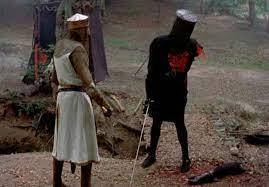
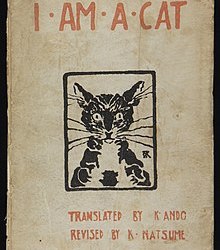
especially in the case of Final Fantasy. with very few exceptions like 7, a lot of them fit better wtih an EN script bc of how much western themed theatrics and setting is packed in there.
as an example, i think i prefer seifer in ff8 for example going "One of these days, I'm gonna tell ya 'bout my ROMANTIC dream!" like a dumbass jock over "itsuka kikasete yarusa! ore no ro~~~~~mantikku na yume wo na!" like a dumbass JP highscooler (which he kind of is, but still not a dipshit jock)
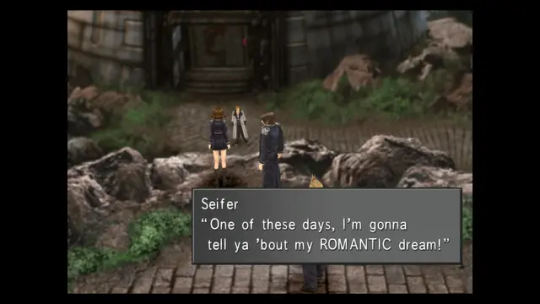

so its really the little things like that. subs not dubs doesnt work for me anymore, im in a very strange place, kupo.
another thing is really, just... the tropes. the deep disconnect between how people behave irl and how anime thinks people behave irl. kind of like how Hayao Miyazaki puts it in 2014,
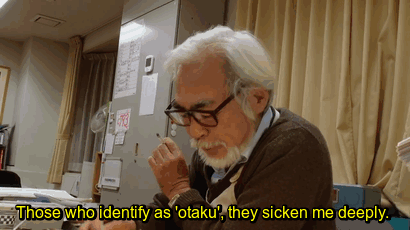
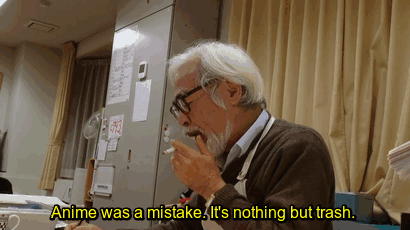
so, learning Japanese has actually done a weird bit where it's caused me to actually fully understand the JP, meaning when i pick up on the script getting off putting, it gets off-putting.
when people usually go "subs not dubs", its voiced from a sense that the JP voice is better than EN. but as the years go by this isn't really true anymore, some dubs can have serious quality that's unthinkable back in 2010 ffs. i think this is largely bc anglo-speaking audience do not understand JP, and so builds an imagination between the sub and the tone of the voice acting to carry the work.
but just like old ps1 horror games, that imagination is doing a good bulk of elbow greasing.
to explain:
there are times when JP writers puts in an objectively anime trope or thing. especially in the case of FE, where sometimes that it becomes 'ew' to people who aren't hardcore anime nerds. im talking things like the whole big booba onee-chan Camilla and the kawaii imouto/otouto Sakura and Takumi tropes thats kinda there in FE Fates. and the JP version of Anna's S support in Engage and the weird undertones thats going there.
masking it with subs can cause the audience to kind of brush it off as "aaah those silly japanese" or "ok this is just an anime trope". i mean, hell, check some discourse from people who yell about how this is censorship essentially defending it from what is effectively lolicon tropes and it's just. :v
and thats the thing. once that localization or sub barrier is removed, once im hearing actual JP and past any subconscious filter, i fully see the scene in its original form. i would then have a reaction exactly like hayao miyazaki.
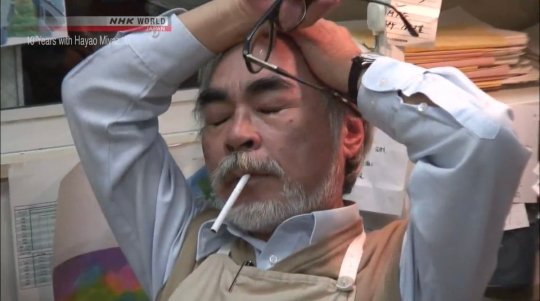
having that ignorance kind of protects an audience from just how deep the writers ouroborous'd themselves into the nerd sphere. i kind of wish i had that sometimes. the creep vibes in some original JP scripts makes me want to crawl out of my skin, and there is no way i can explain this to an audience without first sounding like im disparaging the original work, shitting on the writers, and bringing in my personal bias into the conversation.
which, yeah i guess it kind of is. but man. if elden ring can commit to their bit with anime tropes used in a good/interesting/subtle way, then so can every one else.
when i started learning JP to play JP games never to see the light of localization, this was not the experience i expected, tbh.
so in summary, im totally disillusioned to the idea of Original = Best, Localization = Censorship at this point. that rose colored glasses are hanging on by a thread now. kind of wondering what other stuff i'll run into but it's been a real interesting journey that i totally get if people wont understand.
loneliness and language learning goes hand in hand lol
10 notes
·
View notes
Note
Mr. Naruhodo! Please forgive me for my tardiness, but I have begun to read Jane Eyre! I like very much the style in which is written, but poor little Jane is having such a dreadful time! I do hope things improve for her, or this will be quite a sad book indeed. Are you reading anything at the moment, or do you have a book you would like to read in the future?
Miss Ancalima, hello! I agree with your findings on Jane Eyre, I'm sure that you'll love the rest of the book. As for a book that I would like to read in the future, I have yet to get my hands on Mr Natsume's book that recently came out. "Wagahai wa Neko de aru", "I am a Cat". He promised me a signed copy but I have yet to receive it...
2 notes
·
View notes
Text
really normal discussion/translation notes for the hitoiki song tls ive been working on. just needed a spot to dump them
plus-minus-kakeru-waru
×÷繰り返して心丈夫になる (kakeru waru kurikaeshite kokorojoubu ni naru) is a really, really cute pun. the verb used for multiplication in mathematics is 掛ける– it has several meanings, one of which meaning "to secure" (i.e. locking a padlock, etc). That part combined with 心丈夫 (referring to emotional security or reassurance) can give off the vibe of "securing one's emotional security". this one makes me smile a lot :)
not sure exactly what this line is supposed to mean (what were they cooking?), but the galapagos speed dramatic part of the chorus did lead me to an interesting fact while i was trying to crack it! there's a phrase called the galapagos syndrome, which is a term in the business sector that was coined in japan– one of the early uses of this term is to refer to tech with highly specific features, which was unsuccessful outside of japan. more about that here, it's very interesting and def links back to yusei's role as the akiba rep.
+−の天秤に人生のスパイスを (purasu mainasu no tenbin ni jinsei no supaisu wo). translated as "the positive-negative balance is what spices up our lives". two things here: jinsei is the typical reading of the unit name hitoiki (which, funnily enough, derives the kanji from the names of its two members!), and spice is a nod to the fact the two of them go out to eat curry. i'm not sure if it's mentioned what their preferred spice level(s) are though.
bungaku complex
月が綺麗ですねってこぼしたそれは (tsuki ga kirei desu ne tte koboshita sore wa). this line contains a literary history reference. natsume soseki (author of texts such as botchan/wagahai wa neko de aru) coined the phrase "tsuki ga kirei desu ne" as an indirect translation of "i love you", and it is still commonly used as a method of confession for characters in anime/manga.
電気街 (denki-gai) literally: "electric town". Often tacked onto the end of akiba as a nickname given the prevalence of tech stores in the area. kinda self explanatory.
過去と未来を通りゃんせっせと (kako to mirai wo tooryanse sse to)– tooryanse is the name of a nursery rhyme from the edo period. the melody from this rhyme is often used in crossing signals in japan, with the rhyme itself essentially being about a family trying to celebrate shichi-go-san (rite of passage ceremony for young kids, more detail here).
冥土の土産はメイドが見上げた (meido no miyage wa meido ga miage ta). this one is difficult as hell to translate in a way that conveys the genius wordplay in it, and that very much gives me a migraine because it's so good. 冥土の土産 is an expression which refers to something which the speaker feels can make them pass away in peace– 冥土 in particular referring to hades and his domain in greek mythology. メイドが見上げ literally just refers to looking up at a maid (as the line is sung by yusei, this tracks given akiba's abundance of maid cafes). unironically peak
ほらもう一丁 (hora mou icchou). icchou can refer to a serving of food in a restaurant, which means it's probably a reference to how yusei and rihito are lunch bros who go out to eat together on a frequent basis. icchou, when given the -me suffix, can refer to a city block. this is probably unrelated, but it may even be a subtle nod to the close proximity of kanda and akiba stations– being located less than 10 minutes away from each other in nichome kajicho and icchome sotokanda respectively.
#station idol latch#kileyposting#most mild contribution i could make to society (latch fans) rn umm hiii#i am unfortunately a freak (lit major + japanese lang student) so i have many thoughts on hitoiki esp rihito#there's probs more but this is what i've cooked for now
5 notes
·
View notes
Text
hello everynyan! how are you? fine sank you. OH MY GAH! uh i wish i were a bird. nande anta eigo shabettoru? musume ga amerika ni iku no desu. tori attara? TORI DE WA NAI! wagahai wa neko de aru! neko de nakereba, nandatto iu no da? anta no kao nanka ni miteru na... mori, zenshusho... HMHM MDNSMFNDMGNFMFNF WOAAA IMA SORRI! hmm? omae ga honto no neko ka ne? watashi wa nekojita daga dou da. neko iyooo! ahh, atashi mo nekojita! naraba sono shita hiku nuite kureru! ehhhhh?! NANDE?!
3 notes
·
View notes
Text
so I'm thinking about buying the Japanese translation of Ukridge, because the art is super cute and it looks like a lot of fun.
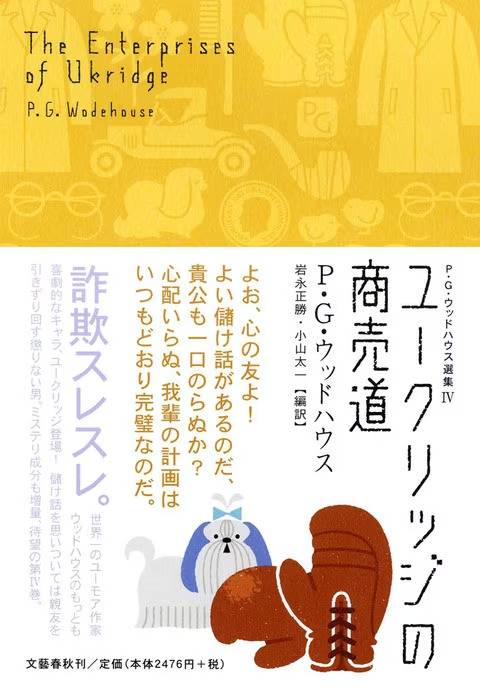
attempt at a literal translation of what Ukridge says on the intro page there (by "literal" I mean "without Edwardianing it up to match the vibes of the original"): “Yo, my bosom buddy! I’ve got a nice moneymaking scheme for ya - won’t you take a bite? You don’t have to worry about a thing - my plan is perfect, like always."
Fun notes about this:
よお (yoo) has the exact same meaning and connotation as "yo" does in English. This is very important to me.
The kanji for "bosom buddy" or "kindred spirit", 心の友 (kokoro no tomo), literally reads as "friend of my heart", which is incredibly cute.
Ukridge speaks very casually here, with ��公 (kikou) being an old-fashioned form of "you" generally said to equals or social inferiors (for the record, it's often rude to even say "you" to someone at all in Japanese if you don't know them well - you're meant to use the third person even when talking to them - and while I have not yet read it in Japanese I suspect Ukridge is kikouing everyone he meets), and changes the negative verb ending ない (nai) to the slangier, more colloquial ね (ne) at every turn. It's such a big part of Ukridge's character that his casual nature has zero regard for class, situation, or decorum, and I love how this translation reflects that.
Easily the best part of this entire translation is the fact that Ukridge's personal pronoun (what he uses to say "I") is 我輩 (wagahai), which carries the connotation of the user being absurdly arrogant. There's a reason Wagahai wa Neko de Aru (I Am a Cat) by Natsume Soseki gives the cat protagonist this pronoun. He is a cat. Cats are like that. And apparently, so is Ukridge. The cocky bastard. I love him so much.
conclusion: there needs to be a Ukridge manga like, yesterday. please. there's already a Jeeves one and it's great. a Ukridge manga would be so much fun.
#ukridge#stanley featherstonehaugh ukridge#extremely embarrassing for corky to be down bad for a guy who uses wagahai. very funny#i'm very curious how they went for corky in katakana#and how they interpreted billson's accent#looking forward to seeing the japanese take on all my favorite lines...
4 notes
·
View notes
Text
Il professore
Il padrone non lo incontro spesso. Pare che sia un professore. Quando torna a casa da scuola si chiude nello studio fino a sera e ne esce raramente. I suoi familiari sono convinti che sia un grande studioso. Lui stesso si atteggia a grande studioso. In realtà lo è molto meno di quanto i suoi credano. Ogni volta che vado a passi felpati a sbirciare, per lo più lo vedo dormire. Di tanto in tanto una bava gli cola sul libro che tiene davanti a sé. È debole di stomaco e presenta i sintomi tipici della dispepsia: colorito giallognolo, pelle spenta, poco elastica… Ciononostante mangia enormi quantità di cibo. E dopo aver mangiato enormi quantità di cibo prende il takadiastase per lo stomaco. Poi apre un libro. Ne legge due o tre pagine e gli viene sonno. Gli colano bave sul volume aperto. Questa è la sua routine quotidiana. Io sono soltanto un gatto, però ogni tanto rifletto. Non c’è niente di più comodo che fare il professore. Se mai rinasco uomo, diventerò professore, è deciso. Un lavoro che permette di dedicare tanto tempo al sonno, chiunque è in grado di svolgerlo, anche un gatto. Eppure a sentire lui pare che non ci sia mestiere più duro al mondo e non fa che lamentarsi con gli amici che vengono a trovarlo.
S. Natsume, [吾輩は猫である - Wagahai wa neko de aru, 1905] Io sono un gatto, Vicenza, Neri Pozza, 2006. [Trad. A. Pastore]
17 notes
·
View notes